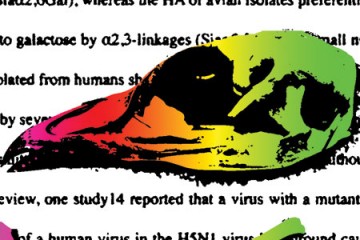If a pandemic were to strike Baltimore, how would hospitals and public health officials fairly allocate scarce resources such as vaccines and ventilators? This isn't a completely hypothetical inquiry: One need only look back to 2009. H1N1, "swine" flu, had spread so quickly that President Obama declared a nationwide state of emergency, yet barely half of the expected 40 million doses of vaccine had shipped from manufacturers. That stressed the health care system up and down the line; at Johns Hopkins people showed up seeking the vaccine only to be told a triage system had been put in place placing pregnant women, toddlers, and health care workers in high-risk situations, and people with compromised immunity at the top of the list.
Fortunately H1N1 didn't become so virulent and potent as to cause a panic or overwhelm the hospital and security. But it did leave university faculty such as Ruth Faden thinking about the next inevitable pandemic and how, by doing serious advance work, the public could have increased confidence in who would get immediate care—and who would have to wait.
"[The H1N1] shortage left us with the clear realization that, rather than make difficult decisions under intense pressure," says Faden, "we should be doing that kind of planning work now, when we have time to consult with the people who would be affected by whatever policies we adopted. We needed to get the community's perspective on how they think difficult ethical issues should be handled."
Faden and colleague Lee Daugherty, a pulmonologist, have focused on the availability of ventilators, which are critical for flu victims who have gone into respiratory distress. There are just over 60,000 full-feature ventilators available for a nationwide crisis, far too few "by orders of magnitude," says Daugherty.
In a collaboration led by Daugherty, researchers from the Berman Institute of Bioethics, the School of Medicine's Division of Pulmonary and Critical Care Medicine, the Program for Deliberative Democracy at Carnegie Mellon, and others began crafting key ethical concepts for public consumption and debate. These include the intriguing "Fair Innings" principle for allocating health resources. Taken originally from baseball's ancestor sport, cricket, the metaphor is that everyone deserves a certain number of turns at bat in life, and if you're in the bottom of your proverbial ninth inning while someone else is just getting their first ups, well, as a society, we owe them a shot at quite a few more at bats.
All told, seven community meetings throughout Maryland are set to discuss the ethics of ventilator allocation. Two have already taken place, and what's impressed Daugherty and Faden is the ability of people from all walks of life, regardless of their educational background, to grasp complicated moral principles and ask informed, insightful questions that further the debate. Faden sees this public give-and-take with decision makers as being far more effective—and ultimately yielding far more meaningful dialogue—than "if we just commissioned a telephone poll that called 1,000 Marylanders and asked, 'If there aren't enough ventilators to go around in a pandemic, which of the following ethical principles would you choose to decide who gets one?' How much confidence would you have that these people knew anything about the choice they made? Why would they have even given it any thought previous to the question?"
Faden's hope, which really is a deep faith in the human condition, is that these kinds of planning forums are the best way to keep pandemics manageable given the reality of scarce resources. The difference, in that heat of the moment, between panic and restraint could well be razor-thin, "so we need to think ahead and in consultation with the public about principles that make good ethical sense to everybody whose lives could be saved . . . or lost."
Posted in Health, Politics+Society
Tagged flu, berman institute of bioethics, ruth faden, pandemic








